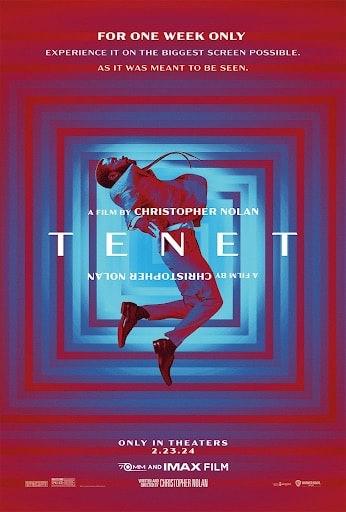|
By Andrew Martinez Cabrera Entertainment Editor Four years ago, a global pandemic shut down the world. On the entertainment front, streaming services dominated the industry and cinemas took a heavy toll. Director Christopher Nolan, a well-known advocate for the movie theater experience, fought for his last film, TENET, to be released in theaters amidst the COVID-19 pandemic. Famously, Nolan fought with Warner Bros. to give TENET a proper theatrical release before putting it on MAX, formerly HBO Max. The rift between director and studio was so strong that they parted ways in a public and ugly divorce, causing him to shop his next film, Oppenheimer, to other studios. TENET went on to gross $364 million upon release, making it the first successful theatrical release during the pandemic but failing to break even on its 200 million dollar budget.
Now, in 2024, TENET was given a second life and re-released in theaters. Over the weekend, I got the chance to see it on the biggest screen possible, as it was meant to be seen. TENET, like other Nolan blockbusters, involves time as a central narrative mechanic but takes it to its most convoluted endpoint. Following a spy known only as The Protagonist (John David Washington), he sets out on an international mission only equipped with a secret word, “Tenet,” where he uncovers a mysterious weapon that can bend an object’s entropy, inverting it. With this physics-laced and incentive plot device, Nolan crafts a Bond/La Carré-esque spy film with a time-travel twist that needs to be seen rather than understood, which viewers often mark as its weakness. Usually, I’m a proponent of logistical narratives in film. However, cinema is a visual medium and TENET is one of the best mainstream examples of letting the images wash over you, even if they’re packaged with dense and incomprehensible exposition. It’s one of the few times that the marketing behind a film rang true when they spoke about TENET as something no one had ever seen before. I’d say that TENET makes more sense the more you see it but the less the viewer understands, the better. It is a cinematic trick pulled on viewers, listening to characters intelligently spew out physics jargon while a pulsating synth soundtrack plays in the background and you’re just left there shaking your head and agreeing just to fit in. In pulling a Raymond Chandler, where the plot becomes so labyrinthine that even the author himself doesn’t understand what’s going on, you only become in tune with the images projected. I don’t know why a car is speeding backward on a crowded freeway during a high-octane car chase or why they have to crash a real-life 747 into a freeport in Oslo, but my brain knows that it’s exciting because it’s a practical spectacle. Once “why” ceases from the viewer’s lexicon, TENET connects. To say that TENET lacks a coherent plot and relatable characters yet rather upholds cold, engineer-like precision over the film’s technical aspects misses the whole of what TENET has to offer. Like Oppenheimer, TENET explores a world in which a scientific breakthrough is destined to destroy us, albeit while also having scenes like the protagonist fighting an inverted version of himself. But infused in these action scenes is the message itself, where someone in the dark quite literally has to grapple with the mistakes of the past to correct the future. It’s a paradoxical conundrum driven by a character’s idealism that ramps up to TENET’s emotional catharsis. Nolan is a humanist and the only way he can articulate it is through scientific language and dramatic, large-scale thrillers. He’s an artist communicating his message through spectacle, even if his dialogue can seem formalist to a fault. When a discussion concerning free will’s effect through inversion arises, a scientist of all characters simply talks about inversion as such: “Don’t understand it, feel it.” While we may not understand what a “temporal-pincer movement” is, we do understand the weight of two characters who see their friendship as cyclically tragic and inevitable, a person’s ability to save oneself, and a familial love that connects us all. While it doesn’t reach the emotional apex of his other movies like Interstellar, to say it’s missing any emotion is a misreading. To say that is not emotionally sufficient is arguable but perhaps I am also idealistic in thinking TENET packages all of this pathos. To reduce myself to the simplest conclusion: the film rocks. So watch TENET with open hearts. Don’t just see it, feel it too.
0 Comments
Leave a Reply. |
STAFFMadison Sciba '24, Archives
October 2023
Categories |


 RSS Feed
RSS Feed